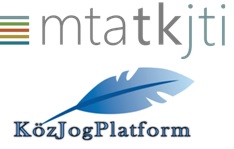
The atypical forms of employment constitute one of the most exciting issues in the world of labour law nowadays. The growth of these relationships is the outcome of multiple forces. It reflects changes in the world of work brought about by globalization and social change – such as the increased role of women in the world’s labour force – but also legislative changes, which characterises the Hungarian situation as well. Read more… (Petra Ágnes Kanyuk)

The Erasmus+ Programme, the European Commission’s current programme supporting education, training, youth and sport in Europe, aims to provide a total of €14.7 billion in funding in these policy areas between 2014 and 2020. Since the adoption of the Paris Declaration in 2015, the programme began allocating specific funding to innovative transnational cooperation projects promoting social inclusion. The aim of this note is twofold: firstly, to examine this specific priority and the projects selected for funding in greater detail, and secondly, to explore the potential of other Erasmus+ actions for the facilitation of social inclusion. Read more… (Dániel Szilágyi)

The first appearance of the concept of vulnerable social groups in a European legal context can be traced back to the case-law of the European Court of Human Rights. The expression was originally usedin relation to the Romani minority, however, in later decisions, the forum drew attention to the vulnerability of several different groups – among others, the mentally disabled, people living with HIV and asylum seekers. The recognition of vulnerability simultaneously requires special measures taken to protect the interests of those affected. Read more… (Dániel Szilágyi)

A piaci tevékenységek működtetésének szabályozási környezete, a reguláció különböző "színtereinek" szerepe Európa-szerte átalakulóban van. Míg a megelőző két évtizedet inkább a nemzetközi piacnyitás akadályainak elhárítására törekvés és az integrációk erősödése jellemezte, utóbb a liberalizáció ellenében átértékelődnek a korábban korlátozásra ítélt kormányzati fellépési eszközök, hangsúlyosabbá téve az ezeket – ténylegesen vagy formálisan – megalapozó társadalmi megfontolásokat is. (A vita időpontja: 2017. június 29. 10.00 óra) Tovább…

Increasing number of re-municipalisation cases and enhancing public influence in service provision indicate a major policy shift in public service management. The former privatisation trend in water management and other infrastructure services seem to be reversed. The question is whether international donors, financing institutions and technical assistance programs acknowledge these changes and take into account this new political reality? Read more… (Gábor Péteri)

One of our previous blog posts already discussed the development of public-private partnership in the last two decades, as well as its benefits and potential negative effects in detail. Yuri Krivorotko's note will examine why PPPs need in Belarus and what are the main results and shortcomings in establishing the necessary regulatory and financial framework. The author argues that, for Belarusian economy and finance, PPP becomes even more demanded and urgent. Read more…

A major goal within the 2013 reform of the EU Common Agricultural Policy (CAP) is “greening” of farming activities (that is land use change to environmentally more beneficial farming practices). The CAP provides direct incentives for such activities by means of green subsidies. This note summarise the results of an "auction game" testing the farmer's motivation for using one of the specific instruments of that greening policy. Read more… (András Kis and Gábor Ungvári)

For a long time the Belarusian authorities characterized their national and subnational budgets with a welfare orientation. This brief note focuses on two questions: (i) what tendencies of social budgetary policy can be observed in the time of economic recession and (ii) how consistent was the welfare orientation of the central and local budgets in practice. Read more … (Yuri Krivorotko)


